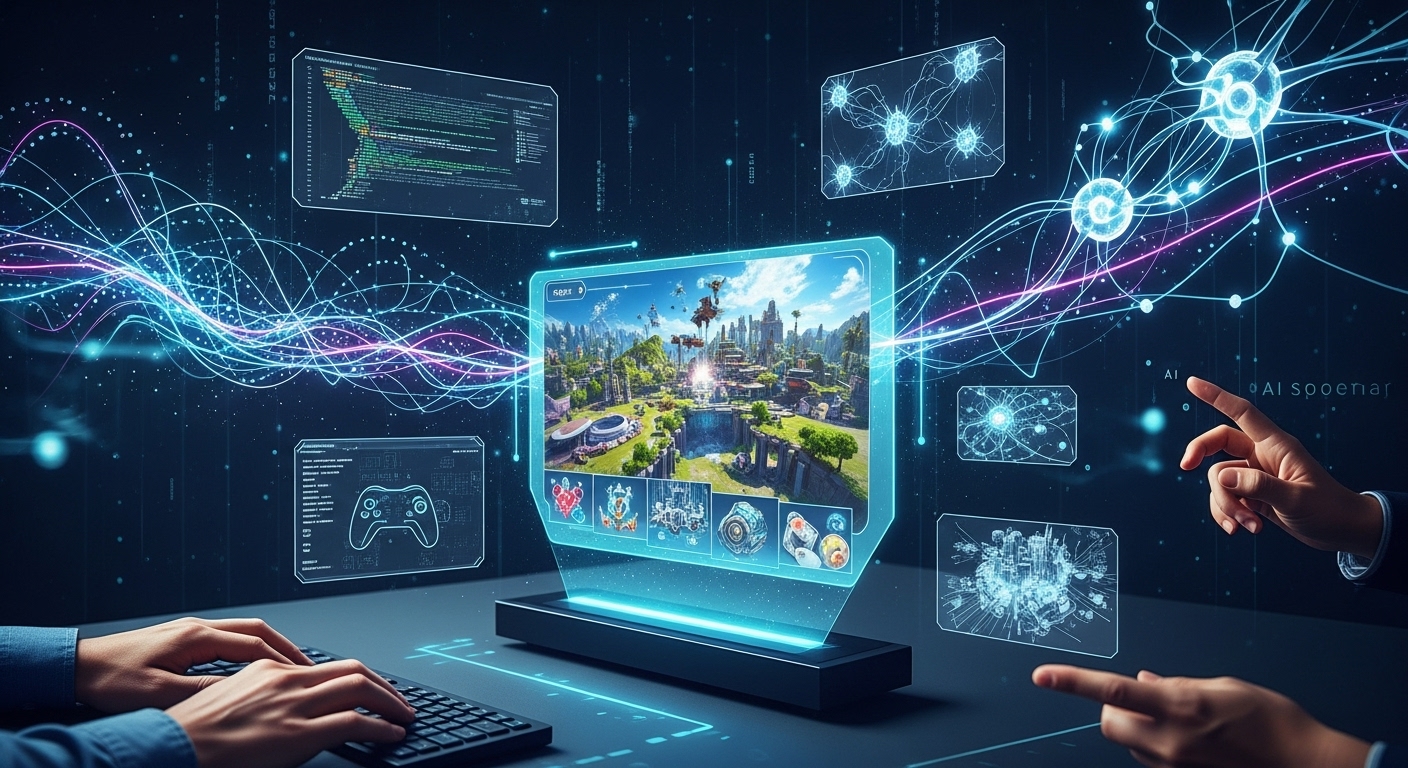
The Role of Artificial Intelligence in Transforming Game Development: A Look into the Future
In recent years, artificial intelligence (AI) has rapidly evolved, seeping into various domains, and fundamentally transforming industries. Among these, the gaming industry has been particularly impacted by AI’s revolutionary capabilities. As we stand at the cusp of a new era in game development, it’s essential to explore how AI is reshaping the landscape and what the future holds.
AI in Game Design and Development
AI has introduced a paradigm shift in game design and development. Traditionally, game development was a labor-intensive process, requiring extensive hours of coding and design. However, AI technologies like procedural content generation, machine learning, and neural networks are changing this landscape.
Procedural content generation allows developers to create vast, immersive worlds without manually designing every element. Games like “No Man’s Sky” have successfully used this technology to generate expansive universes with unique planets and ecosystems. AI algorithms ensure that each player’s experience is distinct, providing endless possibilities for exploration.
Moreover, AI-driven tools are assisting developers in creating more realistic and dynamic game environments. By leveraging machine learning algorithms, developers can simulate real-world physics and behaviors, resulting in more immersive gameplay experiences. For instance, AI can predict player movements and adjust in-game elements dynamically to maintain engagement.
Enhancing Player Experience with AI
One of the most significant contributions of AI in gaming is its ability to enhance the player experience. AI-driven NPCs (Non-Player Characters) are now more intelligent, capable of adapting to players’ strategies and actions. This adaptability results in a more challenging and rewarding gameplay experience.
For instance, AI can analyze a player’s skill level and adjust the game’s difficulty accordingly, ensuring a balanced experience for both novice and experienced players. This personalization extends to content recommendations as well. AI algorithms can suggest games and in-game purchases based on a player’s preferences and behavior, enhancing user satisfaction and engagement.
AI and Virtual Reality Integration
The integration of AI with virtual reality (VR) is another groundbreaking development in the gaming industry. AI algorithms power VR environments to create more realistic and interactive experiences, blurring the lines between the virtual and physical worlds.
AI enhances VR by providing realistic character interactions and environmental responses. In VR games, AI can simulate human-like characteristics in NPCs, making interactions more believable. Furthermore, AI-driven analytics can track player movements and adapt VR experiences in real-time, tailoring the game environment to the player’s preferences and actions.
AI’s Impact on Game Analytics and Monetization
AI is also revolutionizing game analytics and monetization strategies. Data-driven insights are crucial for understanding player behavior, preferences, and trends. AI algorithms can analyze vast amounts of data to provide developers with actionable insights, enabling them to optimize gameplay and monetization strategies.
By analyzing player data, AI can identify patterns and predict future trends. This information allows developers to create targeted marketing campaigns and design in-game purchases that align with player interests. Additionally, AI is instrumental in fraud detection, helping developers maintain a fair and secure gaming environment.
Challenges and Ethical Considerations in AI-Driven Gaming
While AI has brought numerous advancements to the gaming industry, it also presents challenges and ethical considerations. One of the primary concerns is the potential for AI to create addictive gaming experiences. AI algorithms can optimize games to keep players engaged for extended periods, raising ethical questions about player well-being and game design ethics.
Furthermore, the use of AI in player data analysis raises privacy concerns. Developers must ensure that they are transparent about data collection practices and comply with data protection regulations. Balancing innovation with ethical considerations is crucial for the sustainable growth of AI-driven gaming.
The Future of AI in Game Development
Looking ahead, the role of AI in game development is poised to expand further. Advances in AI technology will continue to push the boundaries of what is possible in gaming. Emerging technologies such as reinforcement learning and generative adversarial networks (GANs) will open new avenues for creativity and innovation.
Reinforcement learning will enable AI to learn from player interactions, continuously improving its performance and adaptability. GANs, on the other hand, can generate realistic graphics and audio, enhancing the visual and auditory aspects of games.
Moreover, AI-driven cloud gaming is set to revolutionize the way games are played and distributed. By leveraging cloud computing and AI, developers can deliver high-quality gaming experiences without the need for powerful hardware, democratizing access to gaming for a broader audience.
Takeaways
Artificial intelligence is undeniably transforming the landscape of game development, offering unprecedented opportunities for innovation and enhancing player experiences. As AI continues to evolve, its impact on the gaming industry will only grow, paving the way for more immersive, personalized, and accessible gaming experiences.
However, as we embrace these advancements, it is crucial to address the ethical considerations and challenges that accompany AI integration. By doing so, the gaming industry can harness the full potential of AI while ensuring a fair and enjoyable experience for players worldwide.
AI in Indie Game Development
While major game studios are reaping significant benefits from AI, indie game developers are also leveraging this technology to level the playing field. AI tools are democratizing game development, allowing independent developers to create high-quality games without extensive resources or large teams. Procedural generation and AI-driven design tools enable indie developers to produce content that rivals AAA games in complexity and depth.
Furthermore, AI can assist indie developers in marketing and distribution efforts. By analyzing player data and market trends, AI can help indie games reach their target audiences more effectively, optimizing their chances for success in a competitive industry.
The Role of AI in Esports
The rise of esports presents another exciting frontier for AI in gaming. AI is used to analyze gameplay, providing insights into strategies and player performance. This analysis is invaluable for teams and coaches looking to gain a competitive edge. Moreover, AI-driven analytics can enhance the viewing experience by offering real-time statistics and predictions to audiences, making esports events more engaging and informative.
AI is also being used to ensure fair play in esports by monitoring and detecting cheating. By analyzing patterns and behaviors, AI systems can identify irregularities and prevent dishonest practices, maintaining the integrity of competitive gaming.
AI and Game Localization
Localization is a crucial aspect of making games accessible to a global audience. AI is streamlining the localization process by automating translations and cultural adaptations. Machine translation technologies powered by AI can quickly translate in-game text and dialogue, significantly reducing localization time and costs.
Additionally, AI can analyze cultural nuances and preferences, ensuring that games resonate with diverse audiences worldwide. By understanding cultural contexts, AI can help developers tailor content for specific regions, enhancing the global appeal of their games.
AI in Game Narrative and Storytelling
AI is also revolutionizing narrative design and storytelling in games. AI algorithms can create branching storylines and dynamic narratives that respond to player choices, ensuring each player’s journey is unique. This interactivity enhances player engagement and immersion, making storytelling a more integral part of the gaming experience.
Moreover, AI-driven natural language processing (NLP) technologies enable realistic and meaningful interactions with NPCs. Players can engage in conversations that feel authentic and impactful, allowing for deeper connections with game characters and narratives.
AI’s Role in Game Testing and Quality Assurance
Testing and quality assurance (QA) are critical components of game development, ensuring that games are bug-free and function as intended. AI is transforming these processes by automating repetitive and time-consuming tasks. AI algorithms can quickly identify and categorize bugs, reducing the time required for testing and enhancing overall efficiency.
AI-driven testing tools can also simulate player behavior, identifying potential issues and areas for improvement. By automating QA processes, developers can focus on refining gameplay and enhancing the player experience.
The Future of AI-Powered Game Development
As AI technology continues to advance, its applications in game development will expand even further. We can anticipate more sophisticated AI-driven tools that simplify and enhance the development process, from concept to launch. Game worlds will become more dynamic and responsive, offering players experiences that are personalized and immersive.
Furthermore, AI will play a pivotal role in fostering inclusivity and accessibility in gaming. By analyzing player needs and preferences, AI can help create games that accommodate diverse audiences, ensuring that everyone can enjoy gaming regardless of their abilities or backgrounds.
In conclusion, the role of artificial intelligence in transforming game development is both profound and promising. As we look to the future, it’s evident that AI will continue to push the boundaries of what is possible in gaming, offering exciting opportunities for innovation, creativity, and engagement. By embracing AI’s potential and addressing its challenges, the gaming industry can create a vibrant and inclusive future for players and developers alike.







